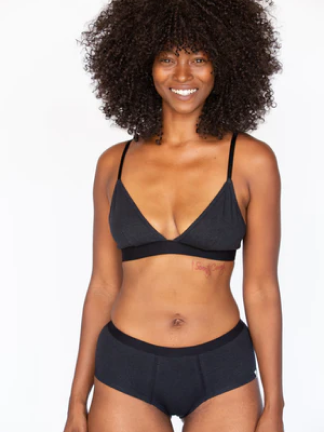
Hiking Underwear: What To Wear On the Trail
|
If you're not happy with your first pair of underwear after trying it on, let us know.
We'll send a new size or color, or give you a refund. No returns needed.

Megan Lemon
|
I’m currently in the weeds planning out my Pacific Crest Trail attempt. And while I’ve dialed in on my backpack, tent, and ultralight quilt, I haven’t yet decided on my hiking underwear. I have my ideal hiking bras (mostly the racerback bralette , which I love for its comfortable fit and breathability). But I can’t decide on if I want to go commando (talk about ultralight!), rock a bikini style, or prevent chub rub with boy shorts. I mean, seriously, what underwear is best for hiking?
I’m going to be hiking for months, carrying everything I need with me as I go. But even if you’re just planning a 1-mile hike in your local state park, you’ll need a comfy pair of undies, too. My goal by the end of this article is to not only help you find your ideal pair of hiking underwear, but also decide once and for all which ones I’m bringing! So let’s discuss the factors for the best hiking underwear as well as specific styles to look for in the best women's underwear for hiking and best hiking underwear for men.
Hiking underwear is a mix of travel underwear and workout underwear . You want something that’s durable enough to last your hike, but soft enough to avoid chafing. It’s important to be both comfortable, supportive, and breathable. But that’s like finding a needle in a haystack if you don’t know where to start.
So before we get into specific undies, let’s discuss some overarching things you want for the best hiking underwear.
What your hiking underwear is made of can make or break your hike. That may seem dramatic, but ask yourself if you want to deal with a downstairs infection while 10 miles outside of town. You want to look for sustainable fabrics , like organic cotton or hemp. I prefer hemp because it’s:
Durable, so your undies will support and protect your sensitive bits on mile 1 and mile 1607
Breathable because nobody wants a swamp crotch as they trek
Antimicrobial to help prevent infections after a few days of wearing the same pair without getting the best wash
Anti-odor because while you should embrace your natural scent while in nature, maybe your hiking partner shouldn’t have to
Soft to protect your sensitive skin from the rough elements
Lightweight because you’re carrying enough weight in peanut butter and jerky already
A UPF fabric , which means you’ll be protected from the sun
Even though you’ll find a lot of polyester or spandex underwear in outdoor stores, it’s not ideal for hiking underwear. Those types of synthetic fabrics are not moisture wicking , hold your body oils and smells, and aren’t very durable, not to mention pretty terrible for the environment. And you don’t want to be contributing to the degradation of the beautiful nature you’re about to be surrounded by.
How should underwear fit for a hike? Not too loose and not too tight. Helpful, right? No? Okay, let me give you a few more details.
Your waistband and leg holes shouldn’t dig into your skin. And when you take them off after a full day, you shouldn’t have any red lines leftover from the seams.
You should be able to move around freely without feeling like your undies are either going to completely slip off your rear end. And they shouldn’t restrict any movement.
The crotch should be snug, but not suffocating. And you shouldn’t have a wedgie after 5 seconds of standing still.
The ideal underwear for a 5-month long thru hike of the Pacific Crest in the summer is very different from the perfect hiking underwear for a winter hike in Maine. You may need your undies to act as another layer of insulation, may need them to double up as swimsuit bottoms for alpine lake swims, or need them to be as minimal as possible in a tropical hike.
Ask yourself the following questions to find out what you need from your hiking underwear:
How long is the hike? How many days will you be hiking?
What bottoms are you wearing? Short shorts that have a built-in underwear situation? Or, long pants that may benefit from a longer style of undies?
How wet do you expect to get from rain or swimming?
What’s the weather going to be like?
Knowing the answers to these questions will help you evaluate the pros and cons of each of the following styles of underwear.
Which women’s underwear styles make the most sense for hiking?
Pros:
Will fit nicely under any type of hiking bottoms
Full enough coverage to act as a swimsuit bottom if needed
Breathable and supportive
Cons:
Won’t prevent thigh chafing
Pros:
Very breathable and minimalist
Adds a little spiciness when you feel a little grubby
Cons:
May be a recipe for a trail wedgie
Not a super family-friendly option for swimming bottoms
Cross contamination of butt bacteria and sensitive vulva skin (especially dicey to deal with out in the backcountry)
Pros:
The ideal anti chafing underwear option for prevent chub rub
Full coverage enough to be swim bottoms or laundry day “shorts”
Cons:
Not the most breathable option
May be uncomfortable with shorts that have built-in underwear
Pros:
Very supportive and protective, especially of sensitive stomach skin
Full coverage as swim bottoms
Cons:
Uncomfortable under non-high waisted bottoms
Not as breathable as lesser-coverage options
Modal, made from beechwood, is a fantastic material for women’s underwear, although, like Tencel, it is not always environmentally friendly. There have been recent technological developments that are helping modal be kinder to the planet, which is great because it’s a lightweight yet super-absorbent fabric. Some other reasons? Read on:
Find out the pros and cons of each men’s underwear types !
Pros:
Very breathable, so you can avoid a swamp crotch
Super flexible, so you can have a full range of motion during all of the rock scrambles
Cons:
May not fit comfortably under tighter or shorter hiking pants or shorts
Lack support, so your family jewels may move around a bit too much
Pros:
Will hold and support your package very comfortably
Full coverage for spontaneous swim opportunities
Great at preventing chafing along the thigh
Cons:
May peek out of the bottom of short hiking shorts
Pros:
Fit will under all styles of hiking bottoms
Very protective and supportive of your bits
Great for shorter men
Cons:
Won’t protect against chafing on thicker thighs
Pros:
Holds your package very comfortably and snugly
Will work with any style of shorts or pants
Super breathable
Cons:
Depending on what you’re used to, they may not be full coverage enough for an impromptu swim (but they can definitely double as a Speedo!)
You may also be considering going commando. Especially with the prevalence of hiking shorts with built-in underwear, it seems like it could be a good, lightweight, and breathable option. And yes, with built-in underwear, it could work.
However, you’re also signing up for some pretty nasty chafe. And going for a swim will either require you to get your hiking bottoms wet or a public indecency charge (which might not matter if you’re deep enough in the backcountry!). And the smell might get a little too much for your hiking partners. So think twice before you leave your tents without your knickers!
Especially if you’re heading out on a multi-day hike, it’s important to know how to take care of hiking underwear to keep yourself clean and smelling fresh. Plus, it’ll lengthen the life of your undies, which means you won’t have to buy a new pair for each hike.
First, learn how to hand wash underwear . You can do this in public bathroom showers (or sinks, but you may want to wait until you’re alone).
But while you may be tempted to dip your drawers into the lake or stream, make sure you’re always following Leave No Trace principles when you’re in nature. That means you should only wash clothing 200 feet from water sources. And only use a tiny amount of biodegradable soap!inside out. The third day, flip them back to normal but wear them backwards. And then on the final day, wear them inside out and backwards! You’ll get four days of fresh(ish) use from one pair!
Second, in between washes, change how you’re wearing your undies to keep a bit fresher. So, one the first day, wear the pair as you normally would. The next day, flip them
After thinking it all through, I think I’m leaning towards a bikini fit. I’ll have the breathability I’m looking for while still having full coverage of all the important bits, which is great for all of my upcoming alpine lake swims!
Which pair are you planning on rocking? Let me know in the comments below!
Get updates on restocks, new color and size releases, and upcoming product launches. You’ll also get a 15% discount on your first order of hemp underwear.


